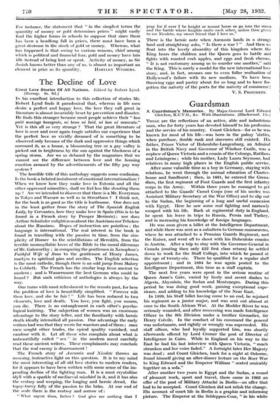War Taxation and War's Aftermath
The Financial Aftermath of War. By Sir Josiah Stamp.
(Ernest Benn. Os.)
WHEN he is not arranging a Reparations scheme, or organizing the working of the L.M.S. Railway, or directing the Bank of England, or assisting the affairs of the Abbey Road Building Society, or the Royal Statistical Society, or serving his country as a member of the Economic Advisory Council, or engaging in countless other activities for the public good, Sir Josiah Stamp devotes his untiring energy and public spirit to illuminating economic questions in books and lectures. How he can get through such an amazing mass of work is a question that leaves us all breathless. The key to the answer is to be found in the terrific pace at which his mind gallops and his single-hearted zeal which always drives him to be doing something on the side of reason and order in this mad and distracted world.
Books written under such conditions cannot be judged by ordinary standards. If they were, a captious critic might sometimes accuse Sir Josiah of scamping his job. When, for instance, one opens his book on War Taxation with the joyous expectation of now really reading all about it, from one who was in the thick of the problem while it was being worked out, one is doomed to some disappointment. Sir Josiah could have written the best book about War finance that ever was seen, if he had been able to give a solid and undistracted month to the task. But, of course, he has been much too busy to do anything of the kind; and so we have to be content with, and thankful for, a sketch of those aspects of the problem that interested him most and came most immediately under his personal notice—namely, War-time Budget speeches and debates in Parliament, and the views of the Ministers and members of Parliament and wealthy taxpayers with whom, as an Inland Revenue official busy on devising and adminis- tering the War taxes, Sir Josiah was in constant communica- tion. Though he does his best to tell us something about the social and political psychology of the development of War finance, the Parliamentary atmosphere in which it was worked out inevitably left the deepest impression on his mind. And this is unfortunate, or seems so to those of us who re- member, or believe, that all through the War public opinion
was ahead of Parliament in its attitude to War finance, and that much more of the War cost would have been paid for out of current taxation if Parliament had had more courage, and if some of the War-time Chancellors of the Exchequer had been less devious and chicken-hearted.
It is also surprising to find, in a book front so noted it statistician, hoW little we are given about the facts and figures of War finance, and the leaping totals of the War Budgets and War Debts. Those who go to this volume to find out how much the War cost and how the money was raised, will have to work very hard to find answers to these obvious questions. Sir Josiah, in short, has written a brilliant essay, which might be filled out into a real history of War taxation, if the Carnegie Endowment for International Peace, on whose behalf the book is published, would set a sufficient staff of spade-workers, acting under his direction, to fill in the details. It need not be said that the book more than fully deserves to be thus rescued from the rather inchoate condition in which it has been left by the diversified activities of its eminent author. Every page has its flash of insight and telling aside. Witness the con- cluding summary : " The effects of war taxation were to stretch to a remarkable extent the whole idea of taxable capacity, and to sot hardly any limit to the ideas of democracy about the available wealth to be used as largess by this means. But the essential difference in this process upon a falling price level has not oven after twelve years dawned upon the average mind.. . . It can safely be said that in no country is the record of war• experiment and experience in taxation more full of interest for the political psychologist, the economist, and the historian than in Great Britain, and these arum's, if they have not done justice to it, are at any rate the words of one who was there to see."
" And so say all of us." The Financial Aftermath of War is the result of a vacation in 1930 at Aberystwyth, charac- teristically employed by Sir Josiah's irrepressible energy in giving five lectures, meant for. " students without any economic knowledge or previous interest," the general public, and the higher forms of schools, and defiling with Taxation, Inflation, Deflation, Reparations and Debts, with an appendix of later date on the Gold Standard. Here again we have a mass of illuminating information and observation on these highly important subjects, but a little more care in exposition would have made it clearer to those whom Sir Josiah is trying to instruct, and saved them from being puzzled or even misled.
Fur instance, the statement that " in the simplest terms the quantity of money or gold determines prices " might easily lead the higher forms in schools to suppose that since there has been a headlong fall in prices, there must have been a great decrease in the stock of gold or money. Whereas, what has happened is that owing to various reasons, chief among which is political and financial fear, gold and money have lain idle instead of being lent or spent. Activity of money, as Sir Josiah knows better than any of us, is almost as important an
element in price as its quantity. HARtLEY WITHERS.









































 Previous page
Previous page